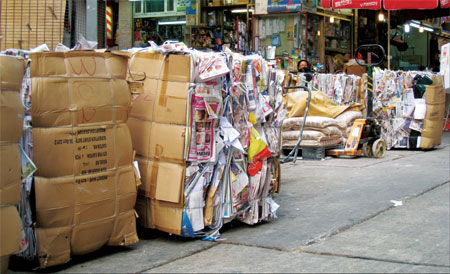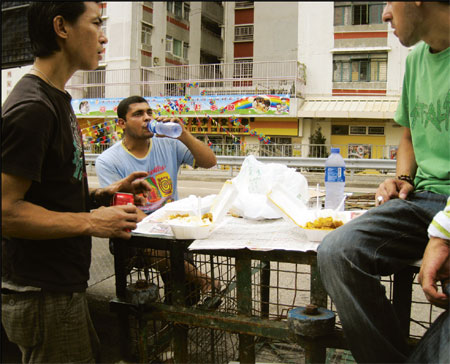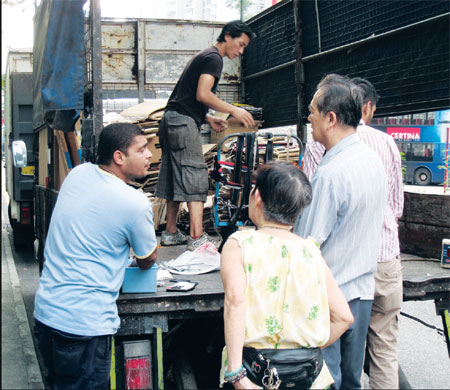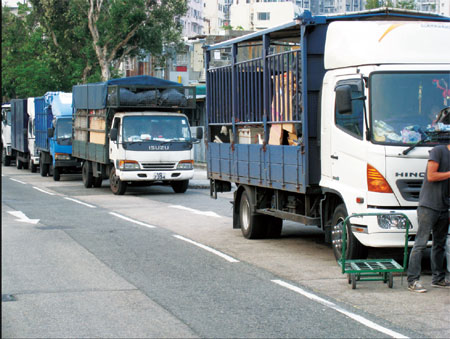Survival on a junk economy
Updated: 2012-11-09 06:29
By SL Luo(HK Edition)
|
|||||||||
|
Tons of compressed waste newspapers and cardboards collected by peddlers pile up outside a Wan Chai "environmental" shop to be transported to a collection center. All photos: SL Luo / China Daily |
|
Lunch break for Sam and his staff in between transactions - the only time he has for a meal. |
|
Sam and his staff attend to his customers at one of their meeting points in Wong Tai Sin. |
|
Trucks loaded with waste materials queue up outside a Cha Kwo Ling collection center - one of the largest in Hong Kong - where they'll be processed and sent to recycling plants on the mainland. |
|
Sam says the number of waste-paper peddlers keeps rising, a reflection of the hardships the poor face in Hong Kong. |
Hong Kong people's resilience and the will to survive are unmatched anywhere else in the world. Thousands of elderly men and women scour the streets every day, peddling waste materials just for a couple of dollars to eke out a living. The number is on the rise as the poverty gap widens. Many are struggling to make ends meet, with some refusing to be on the dole. SL Luo reports.
Octogenarian "Tai Pak", trundles a specially-converted, two-wheel cart out of his cubicle home in a rundown quarter of Wong Tai Sin two or three times every day, come rain or shine.
He rendezvous with the operator of one of the hundreds of so-called "environmental" shops that have sprouted all over the city in recent years to unload his trolley of waste newspapers, cardboard, unused cans and other paraphernalia. Each transaction earns him between HK$10-20.
It's not his pastime or hobby, "Tai Pak" frankly acknowledged. "I have to do it to keep my head above water."
"I've no choice, as I have no children to depend on to survive," says "Tai Pak," who also draws on the monthly HK$1,000 plus welfare "fruit money" to which he is legally entitled, as a "first-tier" senior citizen.
The 89-year-old is among thousands of elderly "garbage" peddlers seen trundling along Hong Kong streets daily to eke out a living by selling whatever old, unused material they can lay their hands on.
Players in the industry say the trend is no coincidence, but is a deep reflection of the sort of economic conditions we are in, with the poverty gap stretching to the limit.
The Hong Kong Council of Social Service (HKCSC), which keeps a regular tab on the city's economic environment, says in its latest report that the number of elderly people living in poverty has seen a drastic spike over the years, with one in three struggling to make ends meet.
The situation has been much aggravated by a rapidly aging population, a gloomy global economic outlook and runaway inflation.
Pakistan-born Ah Sam, an active player in the "garbage business", has seen the number of his suppliers grow more than 10-fold from a mere 20 when he started six years ago.
"But this is no 'lap sap' (rubbish) business, you know. It's a really a billion-dollar operation in Hong Kong," says Sam, who has been a Hong Kong resident for 23 years and speaks fluent Cantonese.
His job is to collect tons of waste newspapers, cardboard, unused tins and cans, as well as scrap metal from his loyal horde of suppliers, who turn up punctually at designated collection spots in Kowloon. The materials then are taken by truck to a key processing center at Cha Kwo Ling, where they are separated, compressed and prepared for shipment to recycling plants on the mainland.
China Daily's reporter was taken on a tour of those collection points. It was an astonishing sight - at least 30 suppliers showed up with their stuff on carts and trolleys within half an hour, for instant transactions.
They are paid at "market rates" - 70 HK cents for a kilogram of waste newspapers and cardboard; 10 cents for each unused can or tin; HK$1 a kg for iron containers; HK$8 for scrap steel and HK$50 per kg for copper.
"Most of them cart in their stuff once every three days. Most earn HK$50 to HK$100 a day, while one of my customers makes about HK$300 daily," says Sam.
"These people are really hard-working. Most, of course, need the money to keep themselves going, while only a few do it because they're bored or they just want to supplement their monthly income."
But, he also had some harsh words for a few of his suppliers who he claims to be too "materialistic" and "tend to go overboard with me". "They're never quite contented with what I'm paying them for their stuff," says Sam.
"Tai Pak" has been peddling waste materials for the past four years, but due to physical constraints, he is able to rake in only a few hundred dollars a month - far less that what his peers are making.
"I'm quite happy with it though. I would like to earn more if my health allowed," he explains.
Many of "Tai Pak's" elderly acquaintances have been in the business even longer. Some are not even on the dole because "they care about dignity" and prefer "not to be bombarded with sneers and petty insults" from neighbors they believe would follow if it were known they depended solely on welfare aid. He wants the Hong Kong government to be aware of what needy people are doing and take an interest. Not everyone who has a conscience wants to rely on pure handouts for a living.
To meet growing demand, Sam works virtually non-stop from 9 in the morning to 8 pm, shuttling between up to six collection points in Kowloon and his tiny ramshackle shop in To Kwa Wan.
The only time he has for a meal would be a few bites over a lunchbox in between.
"When I first got into the business, I had only 20 or so suppliers. That was six years ago. Now, I have about 300. The news spreads like fire, and everybody jumps onto the bandwagon," recalls Sam.
The self-styled entrepreneur had up to 10 workers at one stage, but that's now down to half. They work seven days a week. "Probably, they've learned the ropes and started the same business on their own," he joked.
His assessment may be valid, taking into consideration that he currently handles an average of seven tons of waste material every day, and having to fork out about HK$6,000 to suppliers every day.
"This is simple arithmetic. So, maybe, a lot of people envy me and what I'm earning, and would like to take the plunge themselves," he adds.
Based on his estimates, there are about 1,000 such "environmental" shops in Hong Kong, with 30 percent also involved in the recycling business. Everything occurred over the past two or three years, Sam says.
The biggest operator, he says, collects up to 400 tons a day.
The Shuen Wo Waste Paper Company at Cha Kwo Ling is reputed to be the biggest wastepaper collection center in Hong Kong. That is where all the materials collected are separated, weighed, compressed and packed to be transported to recycling plants on the mainland.
Sam believes that if the recycling business picks up further, and the local economy goes down, the number of "environmental" shops could escalate, which he argues, would also go a long way to help the authorities spread and execute the green message to the community.
Hong Kong's poverty problem is an unending story.
According to the HKCSC's latest report, there's no let up in the ever widening poverty gap, although figures show that the number of people living below the poverty line, particularly the elderly, declined to just above 17 percent last year.
Anyone with half or less than half of the median monthly household income of HK$3,500 is deemed to be poor.
Statistics from Oxfam Hong Kong are equally disturbing. The NGO notes with regret that although Hong Kong people are industrious, they are still unable to afford a decent standard of living for themselves after working hard all their lives.
According to Oxfam, the number of people living in poor households shot up to more than 660,000 - the highest ever - by the second quarter of 2010.
Oxfam blamed the government for taking "inadequate and ineffective" measures to fight the problem. "This is unacceptable," the group warns.
Oxfam suggests that all-round policies must be implemented to help people enter the labor market, introduce comprehensive child-support steps and, above all, raise the minimum wage to take into account a worker's need to support his family.
But, it remains a formidable mountain to climb, economics experts agree.
"Hong Kong is facing an immensely serious aging problem. Can the Hong Kong government carry such an astronomical financial burden when the crunch comes?" asks Grace Ling, who was formerly attached to the Central Policy Unit - the government's thinktank on political, economic and social problems.
In her view, Hong Kong is fortunate in that the poverty problem is being cushioned, to a certain extent, by public housing for some 30 percent of the population, the Comprehensive Social Security Assistance scheme as well as free medical services.
"You have to take all these into account when assessing the poverty gap. You don't find these benefits in many other countries," explains Ling, who's now a senior research consultant with the Hong Kong Institute for Public Administration.
However, she agrees that poverty among the elderly is a very big problem for the city. "They grew up poor, many being single with no children to depend on in their twilight years."
Ling reckons the government must come up with an urgent and effective solution.
"First, let's get the Old Age Living Allowance off the ground. Let them get the money first and think of other plans to help them later," she says.
"I do support an assets declaration on the part of recipients, taking into consideration there would be about three million elderly people in Hong Kong in 20 years' time. The assets cap, however, should be raised to HK$400,000, she says, because with HK$186,000, it could last an elderly person, perhaps as little as three or four years. What will he do after that?"
(HK Edition 11/09/2012 page4)




